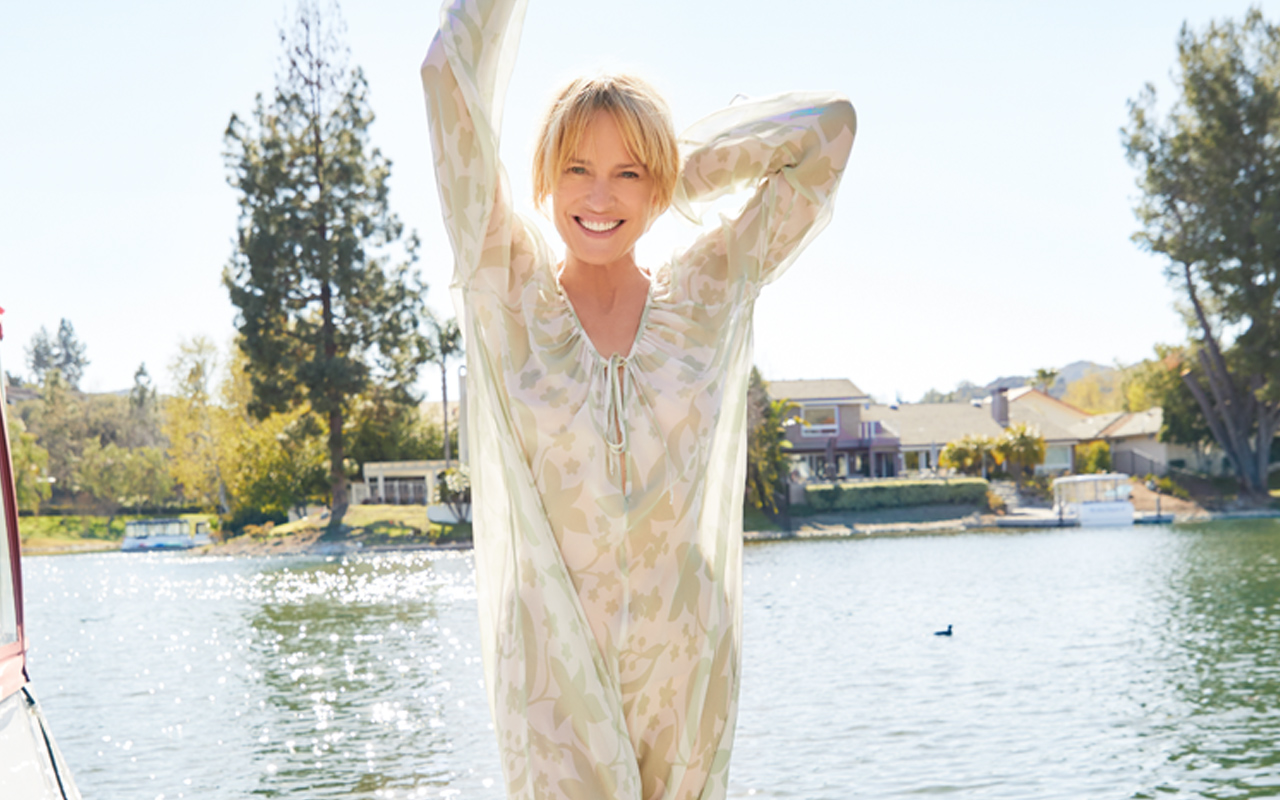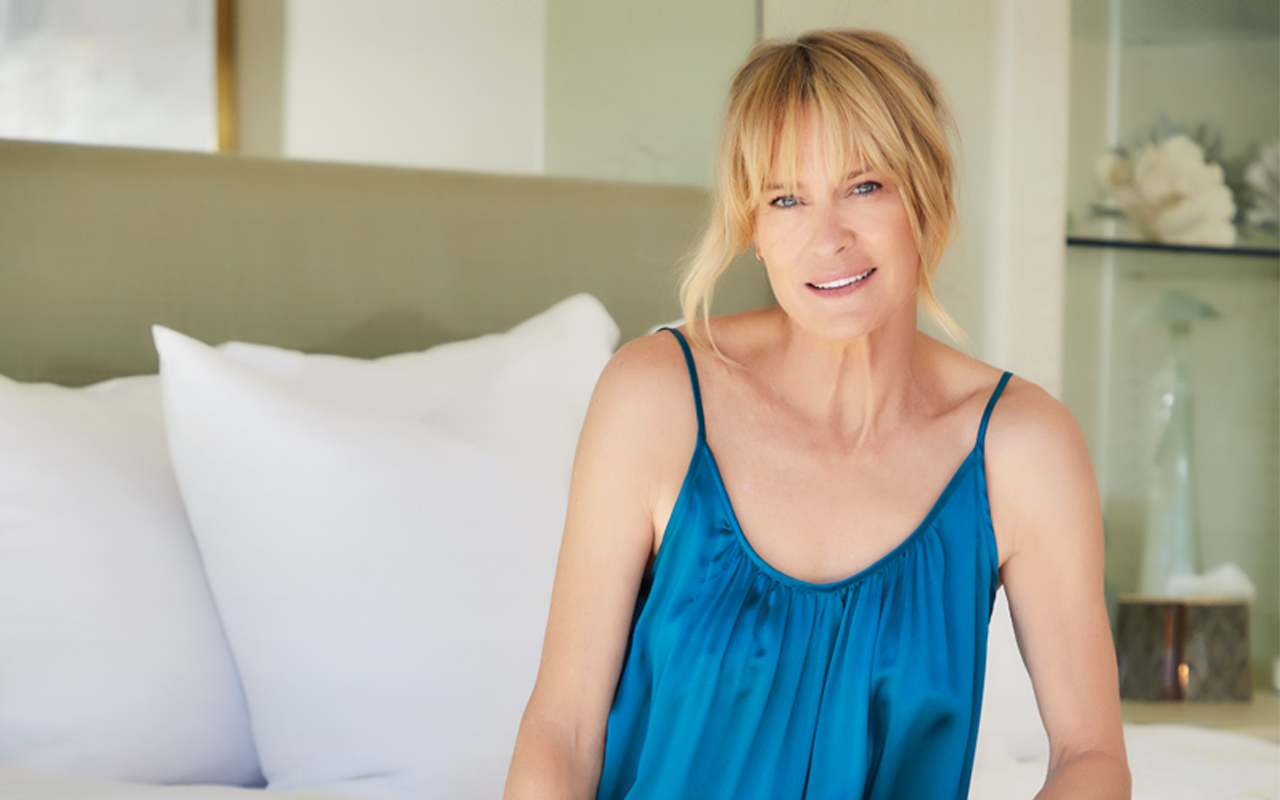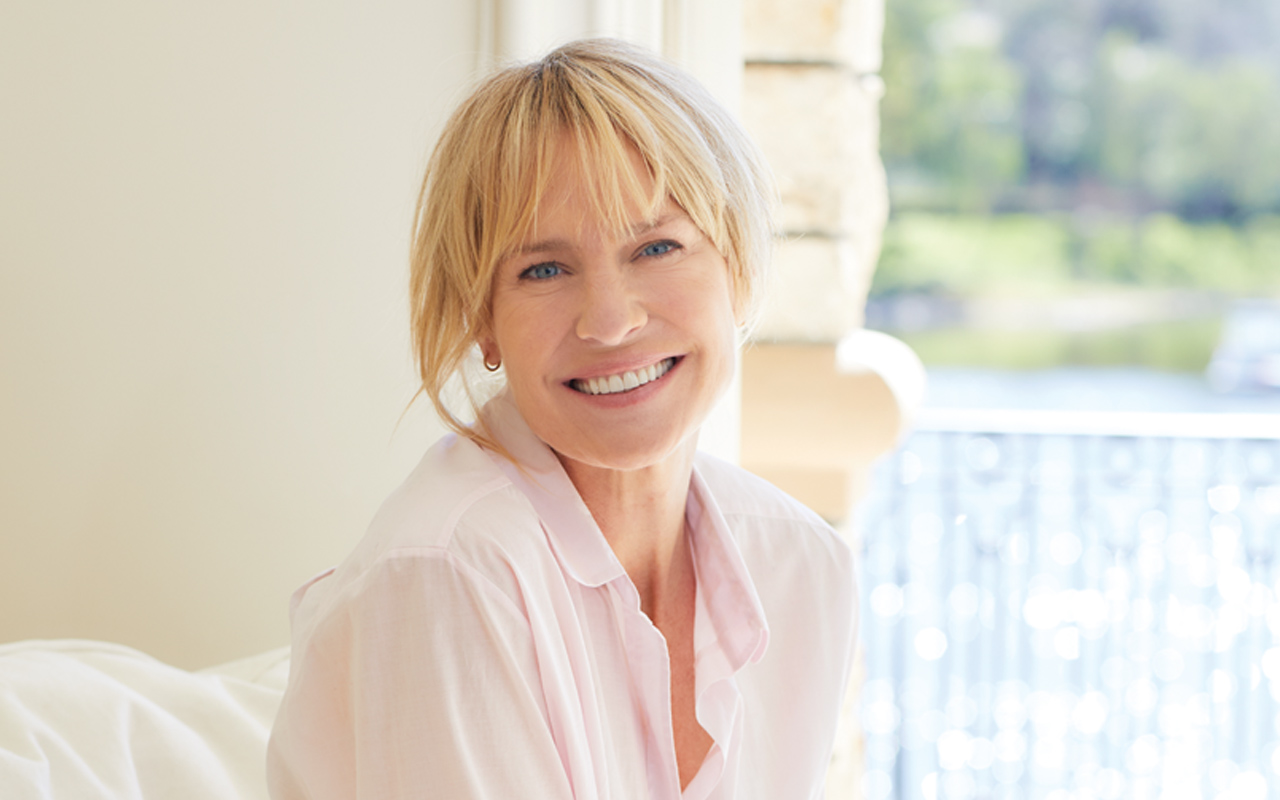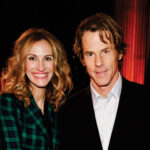
Great actors portray the depths and complexities of the human spirit. Robin Wright’s brilliant acting career has given us valuable insight into the souls of our fellow humans. In ‘Forrest Gump’, she was Jenny, the emotionally wounded young girl who couldn’t receive Forrest’s love because of the unresolved, damaging effects of her childhood abuse. In six seasons of Netflix’s political thriller, ‘House of Cards’, Robin riveted audiences worldwide as she powerfully embodied the ambitious, scheming Claire Underwood who was willing to relinquish her soul in pursuit of her goals. It drew a compelling similarity to Shakespeare’s Lady Macbeth as she encouraged her husband’s vices, and Hollywood rewarded her with a Golden Globe Award for Best Actress in 2014.
‘Land’ is Robin’s 2021 critically acclaimed big-screen movie in which she is both director and lead actor. It is about a woman who loses both her husband and young son to gun violence. Her grief is so unfathomably deep that she removes herself from society, and escapes to a remote log cabin to figure out how to go on living. As she is on the brink of death from starvation, the restorative power of human kindness becomes the redemptive hope in the movie.
Robin’s extensive career is a testament to her talent, versatility, and work ethic. In 2017, she played Lieutenant Joshi in ‘Blade Runner 2049,’ Amazon warrior General Antiope in ‘Justice League,’ and Patty Jenkins’ ‘Wonder Woman,’ the highest grossing superhero film ever. In 2018, she reprised her role as Antiope in ‘Wonder Woman 1984.’
Accolades for Robin’s outstanding performances have poured in over the years. She was honored with a career tribute at the 35th Annual Deauville American Film Festival. Her first two nominations, a Golden Globe and Screen Actors Guild for Best Supporting Actress, came as early as 1995 for her unforgettable role as Jenny in Robert Zemeckis’ Best Picture Oscar winner, ‘Forrest Gump.’ Robin earned her second Screen Actors Guild nomination for Best Lead Actress in Nick Cassavetes’ ‘She’s So Lovely,’ and her third nomination for Best Actress in a Television Movie or Miniseries in Fred Schepisi’s ‘Empire Falls.’ She has received three Independent Spirit nominations for her performances in Erin Dignam’s ‘Loved,’ Rodrigo Garcia’s ‘Nine Lives,’ and Jeff Stanzler’s ‘Sorry, Haters.’ Additionally, Robin starred in and served as an executive producer on Deborah Kampmeier’s ‘Virgin,’ which received an Independent Spirit nomination for Best First Feature – also known as the ‘John Cassavetes Award.’
Robin’s other film credits include ‘Everest,’ ‘A Most Wanted Man,’ with the late Phillip Seymour Hoffman; ‘The Congress’; David Fincher’s highly acclaimed ‘The Girl with the Dragon Tattoo,’ Bennett Miller’s ‘Moneyball,’ starring Brad Pitt and Jonah Hill; Rob Reiner’s cult classic ‘The Princess Bride;’ Barry Levinson’s ‘What Just Happened,’ Deborah Kampmeier’s ‘Hounddog,’ which Robin also executive produced. Kevin Macdonald’s ‘State of Play,’ Anthony Minghella’s ‘Breaking and Entering,’ Zemeckis’s ‘Beowulf,’ Keith Gordon’s ‘The Singing Detective,’ Peter Kosminsky’s ‘White Oleander’; Anthony Drazan’s ‘Hurlyburly’; Sean Penn’s ‘The Pledge’; Luis Mandoki’s ‘Message in a Bottle,’ M. Night Shyamalan’s ‘Unbreakable,’ Pen Densham’s ‘Moll Flanders,’ Levinson’s ‘Toys,’ and ‘Room 10’ for GLAMOUR magazine’s ‘Reel Women Film Series.’
But the really important story behind this cover interview is so much deeper than a recital of Robin’s accomplishments. Great actors are usually deeply sensitive, and a rare few – the ones with deep souls – require the sustenance of some form of humanitarian outreach. Robin’s humanitarian work stems from the propulsion of responsibility. Walking on and off sets isn’t enough nourishment for this woman with an Amazonian heart. She is incapable of witnessing worldwide human suffering while not stepping up to help. In 2016 she launched ‘Pour Les Femmes,’ a socially conscious sleepwear line that prides itself on supporting charitable organizations that directly help women in conflict regions around the world. The Congo in Africa is a particularly beleaguered country that is enormously rich in minerals and natural resources. As a result, it has been pillaged and plundered for centuries by first-world countries intent on using its loot to enrich themselves. The people of the Congo have suffered immeasurably as competing factions have gone to war – killing, maiming and raping the Congolese people in the crossfires of greed.
It became irrefutably clear to me as our cover interview evolved that Robin’s heart lies in the quality of human life, and she’s incapable of turning a blind eye to the human casualties that aggregate from unethical leadership and monetary power grabs.

“‘Land’ was so moving to me – not only because it was about loss and grief – but because it’s a profound story about human resilience, human connectedness and human kindness.”
That conversation all began when I asked her why she had picked ‘Land’ as her recent directorial film project. She explained,
“As House of Cards was drawing to a close, I started reading material to direct. ‘Land’ came to me from Allyn Stewart (who produced ‘Sully’). It was during the time when we were experiencing a spate of random shootings in our country. We’d wake up in the morning to hear about the next mass shooting – this time in Florida – as if it had become the norm. When I read the ‘Land’ script, every day I was feeling the pain in my heart for the devastated people who had lost their loved ones to another random shooting. I wondered how they got through a tragedy of this magnitude. It rocked my world thinking about that. Also, three years ago, one of my oldest and dearest friends lost her 21-year-old daughter to suicide. I watched her grappling with her insurmountable pain. We are not supposed to outlive our children. ‘Land’ was so moving to me – not only because it was about loss and grief – but because it’s a profound story about human resilience, human connectedness and human kindness. I wanted to make this movie and send this message out. In it, I ask Miguel, this stranger, why he helped me, and he responds with, ‘You were in my path’. This is the beautiful side of humanity and I wanted that uplifting and powerful message to be conveyed – this beautiful bond between two strangers in which human compassion and kindness triumphs.”
The conversation naturally leads to Robin launching her humanitarian sleepwear line, ‘Pour Les Femmes,’ which provides life-saving funds for the people in the war-torn Congo. Modern technology has exacerbated the scramble for precious minerals in the Congo as high-tech companies set their sights on coltan, tungsten, manganese and other rare minerals – to manufacture their next cutting-edge gadget. Robin supplies the facts:
“The tragedy of the Congo all started hundreds of years ago with Belgium’s King Leopold, who went into this African gem to garner its rubber. While doing this, he murdered the Congolese people en masse and chopped off their limbs. For centuries, the people of the Congo have been targeted because of their natural resource wealth.”
“John Prendergast, who runs the Washington D.C.- based non-profit ‘Enough Project,’ approached me and asked if I could step in to help him in New York. I was to watch and present a film called ‘The Greatest Silence’ to a New York audience. It was about rape in the Congo, and the weapon of war that was being used against women, particularly with all the militia groups and the domino effect of that. I was traumatized by the statistic of a woman being raped in the Congo every 48 minutes, all because of the minerals in that country. I recognized that as a consumer, I had a responsibility to raise more awareness about the culture of rape and its connection to the ravages of war in the country.”
“I willingly climbed on the bandwagon with John Prendergast to set into motion putting pressure on electronic companies so that they would agree to greater transparency when it came to sourcing the minerals that are vital to their industry. In particular, they have a responsibility to insure that they avoid procuring minerals that are wrought from bloodshed. It’s exactly the same as blood diamonds. Our lobbying worked. Intel agreed to go 100% conflict-free. As John kept saying, ‘this is exactly like blood diamonds, and it took ten years to clean up the diamond trade.’”

“John Prendergast, who runs the Washington D.C.- based non-profit ‘Enough Project,’ approached me and asked if I could step in to help him in New York. I was to watch and present a film called ‘The Greatest Silence’ to a New York audience. It was about rape in the Congo, and the weapon of war that was being used against women, particularly with all the militia groups and the domino effect of that.”
Robin continues, “About six years ago, one of my dearest friends, Karen Fowler, who’s also the co founder of ‘Pour Les Femmes’ – suggested we could produce a sleepwear line – a perfectly lightweight, comfortable, sexy pajama, and by doing this we could help amplify women’s voices by using some of our profits to expand the Congolese community centers and society groups that are in and around Kivu and Goma – where women can find safety after being raped.”
“Hillary Clinton had visited the Congo in 2009 and when she returned, she made a public statement that the crisis in the Congo was the unfinished business of the 21st century. I had the opportunity to travel to the Congo with the ‘Enough Project’, and while there I spoke to women in refugee camps and in civil society communities (which were safe houses), and that’s where we began. We funded these centers so that they could teach these traumatized women – skills. Additionally we funded a PEACE school on the campus. ‘Pour Les Femmes’ is only four years old but we’ve already been able to give back to these women a slice of their dignity. They don’t want handouts. They want to feel a sense of purpose by working. They’ve sown and built capsule collections for our website (pourlesfemmes.com). We call it our ‘Congo pajama’ and we want to continue to give them work.”
I asked Robin what she particularly learned while interviewing the women she visited in these safe houses:
“There is nothing but profound shame,” she responds. “When a woman is raped in this society, the community blames her. Need I say more? This ignorance doesn’t just exist in Africa. There are many people in first-world countries who infer that women invite rape in some shape or form. How can you hold your head up when you are confronted with that kind of brainwashing? We went to visit a center and marveled at how the women were shepherded towards re-empowering themselves. Then I met this beautiful person, Amani Mataboro, who started ‘Action Kivu,’ a non-profit organization dedicated to repairing the harm done by years of violence and neglect in the eastern Congo region. Amani has helped so many women in such an important and meaningful way. I met a young lady she had nurtured who had gone on to become a successful lawyer, and that’s a beautiful outcome. These are strong, resilient women who wanted their lives back. They wake up with hope and fortitude – despite everything they’ve experienced.”
Robin’s experiences are extensive. She says, “I recall going to Senegal with a friend, and we were walking with women who broke out into a beautiful African dance. Just then, a young man riding a bicycle came towards us, and spoke to a woman in their local dialect. She dropped to the ground crying upon hearing his words. She had just learned that her brother had been killed. The man scolded her by saying, ‘stop crying. You are not crying for him. You are crying for YOU!’ At that moment she dried up all her tears and walked all the way to the town with us – showing no emotion whatsoever. There’s a stoical resilience amongst these people that I had never witnessed before. Despite all the strife they’ve experienced, they forge on with such strength.”
We change topics completely. I ask Robin about ‘House of Cards’ which ran for six years, and which recently ended with the completion of Season 6. Not only did Robin star in the immensely successful series, but she served as an executive producer and director. She describes the experience like this:
“House of Cards was a huge chunk of my life. We would shoot for seven months every year and we did it for six seasons. You build a family around something as engrossing as that because you see the crew and the cast more than you see your own family. It was such a wonderful group of people and we had so much fun. The lunacy that surrounded some of our lines became hilarious. Oftentimes we’d say our line, and we’d crack up laughing so hard that they had to cut filming. It was very melancholic when it was all over. I particularly loved directing the show.”

“House of Cards was a huge chunk of my life. We would shoot for seven months every year and we did it for six seasons. You build a family around something as engrossing as that because you see the crew and the cast more than you see your own family.”
Robin’s core belief in the world needing to be a just place is evident when we talk about the Academy Awards, the Golden Globe Awards, and the SAG Awards. I ask her if she felt a massive sense of achievement when she won a Golden Globe for ‘House of Cards.’
“It is nice to be honored. At the same time, the label ‘the best’ doesn’t really apply unless all actors in that category played the same character. Separate films are non comparable so it’s an entirely subjective evaluation. I always think about the ignored actor who nobody says a peep about – even though his or her performance in a movie was great. What about them? It’s a shame that deserving people sometimes get left out.”
On the topic of what her favorite role has been in her repertoire of movies, Robin says with robust enthusiasm, “‘Wonder Woman 1984.’ Playing the role of Antiope was just such a hoot. My other favorite was ‘Private Lives of Pippa Lee.’ Both movies had great messages. When I finally was given the opportunity to break away from being typecast, it was a joy. During a long stretch of my career, I was cast as ‘the pained woman,’ and that can be very emotionally draining so when I finally got the opportunity to play other characters, it was liberating (Robin laughs).”
I ask Robin why she chooses the projects and characters she does.
“I think the chapters of my life dictate the materials that are right for me. Life is very seasonal. There were times when I was given scripts and I knew I wasn’t ready to play the role offered. I’d love to do a great comedy,” Robin enthuses. “That’s definitely a huge bucket list wish.”
Robin’s daughter is 30 years old and her son is 28. Of motherhood, she melts into a naturally glowing zone: “Oh my; I wanted to be a mommy ever since I was four years old.” As for her favorite indulgence – especially when she’s not working – it is definitely travel, and seeing more of the world and all its cultures.
The week we worked with Robin at Bob Byer’s beautiful home on the lake in Westlake Village (thank you, Bob Byers, and Team Nicki and Karen of COMPASS, for use of 32156 Oakshore Drive) was a reminder of what decency, professionalism and a strong work ethic looks like. This A-list actor put everybody at ease as she glided effortlessly into a powerful, all-day cover shoot. There was no vanity or fussing. She generously contributed 100% of herself and reminded all of us – by her actions – that treating others with respect is the essential basis for our shared humanity.
Despite her considerably packed schedule as an actor, what is so impressive about Robin is how much time and effort she devotes to changing the scope of human suffering in the Congo. Without her advocacy and resources, the on-the-ground organizations in the country like ‘Action Kivu’ and ‘Synergie’ would never have been able to accomplish the extensive rehabilitative success stories that they have achieved. Robin’s contributions through ‘Pour Les Femmes,’ the ‘Enough Project’ and ‘Stand with Congo’ have played a crucial role in healing the victims of lifelong warfare.

“My fervent hope is that we can collectively reduce or eradicate the supply and circulation of deadly weapons in the world, and that starts with our own country. A non-violent society is the essential premise for a peaceful and less painful future.”
A most compelling and educative documentary on the Congo called ‘When Elephants Fight’ is executively produced and narrated by Robin. It’s a powerful, insightful look into the magnitude of suffering in a country that is mostly invisible to the rest of the world. The great tragedy about war is that its roots often involve human greed, and the longer the war lasts, the greater the societal ramifications. Young boys become conscience-blunted child soldiers. Without an education, they are indoctrinated into believing that killing someone with an automatic weapon makes them strong. When that is the only life they’ve ever known, the young girls and women of that country become the victims of their inhumanity.
And that is why Robin concludes our interview with an impassioned and earnest plea for all of us to step up and do our part as consumers and as voting members of society. Destructive wars can be replaced by peace when enough people use their singular power to change the outcome.
“If we all knew that our smart phone was derived from a killing field in the eastern Congo, would we still enthusiastically purchase it?” says Robin. “I don’t think so. Being educated on the bloodshed behind the materials must surely change our choices and behavior? My fervent hope is that we can collectively reduce or eradicate the supply and circulation of deadly weapons in the world, and that starts with our own country. A non-violent society is the essential premise for a peaceful and less painful future.”






